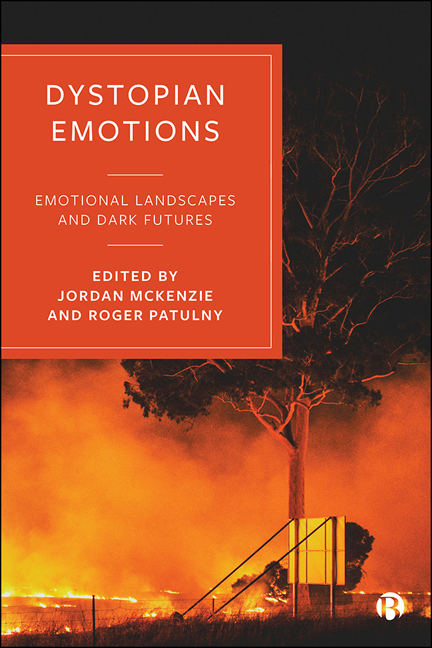Book contents
- Frontmatter
- Contents
- Notes on Contributors
- Acknowledgements
- Introduction: The Feeling of Dystopia
- 1 Borderland Emotions: A Case Study of Youths in Kinmen, Taiwan
- 2 Beyond Wicked Facebook: A Vital Materialism Perspective
- 3 Detangling Online Dystopias: Emotional Reflexivity and Cyber-Deviance
- 4 Mass Emotional Events: Rethinking Emotional Contagions after COVID-19
- 5 Between the Nationalists and the Fundamentalists, Still We Have Hope!
- 6 ‘The New Economy and the Privilege of Feeling’: Towards a Theory of Emotional Structuration
- 7 Neo-Villeiny University
- 8 Resuscitating the Past: Zygmunt Bauman’s Critical Analysis of the Recent Rise of Retrotopia
- 9 Hope Out of Stock: Critical and Melancholic Hope in Climate Fiction
- Conclusion: A Critical Mass of Emotions – Reflexivity, Loneliness and Hope?
- Index
Conclusion: A Critical Mass of Emotions – Reflexivity, Loneliness and Hope?
Published online by Cambridge University Press: 13 May 2022
- Frontmatter
- Contents
- Notes on Contributors
- Acknowledgements
- Introduction: The Feeling of Dystopia
- 1 Borderland Emotions: A Case Study of Youths in Kinmen, Taiwan
- 2 Beyond Wicked Facebook: A Vital Materialism Perspective
- 3 Detangling Online Dystopias: Emotional Reflexivity and Cyber-Deviance
- 4 Mass Emotional Events: Rethinking Emotional Contagions after COVID-19
- 5 Between the Nationalists and the Fundamentalists, Still We Have Hope!
- 6 ‘The New Economy and the Privilege of Feeling’: Towards a Theory of Emotional Structuration
- 7 Neo-Villeiny University
- 8 Resuscitating the Past: Zygmunt Bauman’s Critical Analysis of the Recent Rise of Retrotopia
- 9 Hope Out of Stock: Critical and Melancholic Hope in Climate Fiction
- Conclusion: A Critical Mass of Emotions – Reflexivity, Loneliness and Hope?
- Index
Summary
Introduction
It seems opportune to end this book reflecting on the media see-sawing between utopian and dystopian depictions towards the end of the tumultuous year which was 2020. One brief snippet says much: in the week in which this chapter was drafted, the media was dominated by images of people representing half the population of the US dancing on the streets in masks in a great outpouring celebration of the downfall of the ‘autocrat’ Donald Trump. Meanwhile, the other half raced to fill the feed of social media and conservative websites with protests about election fraud, and claims that even darker times lay ahead under the ‘dictatorship of the deep state’; a few short weeks after this chapter was drafted, some of their number stormed and occupied the US Capitol Building. The emotional maelstrom in which half raged, laughed and cried was brewed in the cauldron of the COVID-19 pandemic that has (so far) claimed over 700,000 lives in the US alone, with numbers still climbing.
In these extraordinary times, utopian and dystopian sentiments seem to have morphed into powerful preoccupations imbuing our thoughts and feelings, and undermining any capacity for reasoned public debate. A considered scepticism about possible futures is being replaced by a powerful bitter-sweet longing and hope for utopia combined with a genuine fear of a coming dystopia. Are we witnessing the triumph or the end of ambivalence (Burkitt, 2002)? Will fatigue with post-modern complexities and half-measures and an escalation in our collective desire to break through lead to a new, clearer, simpler way of feeling? Or to a Simmelian desire for blase and deadening of emotional motivation altogether?
Have we reached a critical mass of emotions?
What seems most apparent to us is that new, powerful and often simplified emotional and affective sentiments have been raised up as key explanators of much that seems enormously right (utopian) and wrong (dystopian) in contemporary public discourse. Some studies and discourses refer to the role of specific emotions in key situations, for example, anger in US politics (Hochschild, 2016), distress over climate change (Albrecht et al, 2007) or empathy and shame in the ongoing impacts and reactions to colonization (Hutchison, 2014). Others refer to the role of affect in describing numerous cultural and political processes, as part of the affective turn in cultural sociology (Ahmed, 2004).
- Type
- Chapter
- Information
- Dystopian EmotionsEmotional Landscapes and Dark Futures, pp. 176 - 183Publisher: Bristol University PressPrint publication year: 2021
- 1
- Cited by



